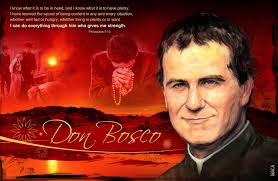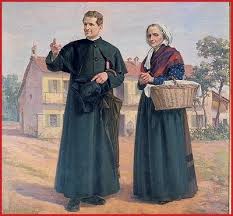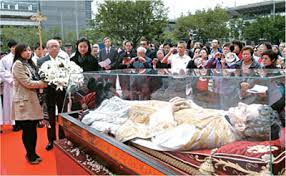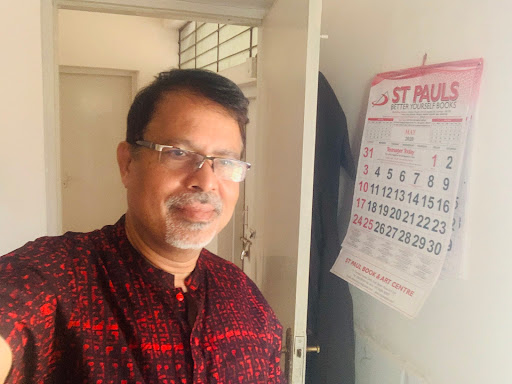I am reproducing a beautiful, inspiring and thought provoking homily of a Salesian Priest.
Dimapur
(IND), 06 November 2009
Therefore while we thank the Lord for the gift he
has given us in Don Bosco, we want to draw from him the inspiration and the
strength to do whatever we are called upon to do in this part of India today.
From this point of view the Word of God
becomes very illuminating, because it helps us to see how great Don Bosco was
and how we can imitate him today in the new social context.
It is well known that born in Castelnuovo
d’Asti in 1815, John was taught the faith and the practice of the gospel
message by his mother. At just 9 years of age he came to understand from a
dream that he was to devote himself to the education of the young. While still
a boy he began to entertain his companions with games interspersed with prayer
and religious instruction. When he became a priest he took as his programme of
life: «Da mihi animas, caetera tolle», and began his apostolate among
the poorest youngsters founding the Valdocco Oratory and putting it under the
protection of St Francis of Sales.
With his educational method and his pastoral
practice, based on reason, religion and loving kindness (the Preventive System)
he led adolescents and young men to reflection, to a meeting with Christ and
with their companions, to education to the faith and to its celebration in the
sacraments, to apostolic and professional commitment. Among the best fruits of
his educational method is fifteen year old St Dominic Savio.
The source of his untiring activity and the
effectiveness of his work was a constant “union with God” and a total trust in
Mary Help of Christians whom he felt was the inspiration and support of
everything he did. And to his Sons he left as a legacy a spirituality that is
simple but soundly based on the Christian virtues.
In fact the first reading gives us one of the great
spiritual and educational insights of Don Bosco, that is that the love of God
and for God is the source of joy, so that he could say to the boys in the
Oratory: “Here we make holiness consist in always being cheerful.”
Perhaps we ourselves need to learn not to consider
God as a threat to our happiness but rather as the source of happiness and
life. Perhaps we need to learn from Don Bosco to have a smiling face and a gaze
that is calm, optimistic, far-sighted that shows that we are believers in a God
who was crucified yes, but who rose again and has filled our human lives with
joy and hope. Perhaps we need to help the young to have the experience of how
happy one can be while serving God.
The reason for this truth, that is: “the law of the
Lord is perfect, it revives the soul, rejoices the heart and gives light to the
eyes,” as the responsorial psalm says, is to be found in the fact that
basically the law is at man’s service, to make him ever more human and not to
oppress him.
This is possible when one discovers that laws and
commands are meant to encourage virtue and are therefore the expression of
love. St Paul in the first letter to the Corinthians that we have just heard
refers to this.
Without love the most precious gifts of both nature
and grace would be of no use. The primacy of love arises precisely from the
fact that it leads us to maturity, to reach the perfect stature that makes us
‘divine’, since it makes us like God. Precisely because it has the immense
power to transform people from within it also has the force to conquer death.
Living in God’s friendship – as Don Bosco proposed to
his boys – means then living in communion with him, remaining united with him
through keeping his commandment of love.
Living in joy means giving full rein to all the best
of intentions in our hearts the source of everything that is good.
Living in this way, when all is said and done, means
being salt of the earth, light of the world, a city on a hill-top, in other
words, people who are doing good as Jesus wants his disciples to be.
The extract from Matthew’s Gospel would appear to
have been the programme of Don Bosco, who was well aware of the responsibility
that we Christians have “before men.”
The salt
of the earth, the hope of the world, are those who preserve human and
religious values that ensure that the earth does not go to the bad, that it retains
a modicum of humanity.
We too are the salt of the earth when we live the spirit of the beatitudes, when
we make the Sermon on the Mount our identikit
and we become something of an alternative society, people who, faced with a
society that idolises success, the transitory, the temporary, money, pleasure,
power, revenge, conflict, war, chose peace, forgiveness, mercy, generosity,
a spirit of sacrifice, beginning in our
immediate circle, our own family or community, but then expanding to embrace
the whole of society.
Jesus warns, however, that it is possible for
salt to lose its taste, for his disciples not to be genuine, and he does not
hesitate to point out the disastrous consequences: «It is no longer good for
anything except to be thrown out and trodden under foot by men.» Either we
are disciples with a clear gospel identity, meaningful, therefore, and useful
to the world, or we are to be thrown out, to be scorned, we are the most
unhappy of men, the misfits, we are nothing.
We are the light
of the world , as He is the light, if we live gospel beatitudes; we are a
city on a hill, if we accept the public responsibility we have and do not
try to make the faith or our discipleship a private matter, without a social
dimension, with public involvement; we are a lamp on a lamp-stand, if we
live according to the Gospel and give light to everyone believers or not,
disciples or not, those near or far away; in other words, light for the whole
world.
, as He is the light, if we live gospel beatitudes; we are a
city on a hill, if we accept the public responsibility we have and do not
try to make the faith or our discipleship a private matter, without a social
dimension, with public involvement; we are a lamp on a lamp-stand, if we
live according to the Gospel and give light to everyone believers or not,
disciples or not, those near or far away; in other words, light for the whole
world.
Christianity, the faith, the Gospel, the Salesian
Family have a social role and a public responsibility for the simple reason
that every vocation is mission.
This is the meaning of the exhortation with which Jesus concludes, and which even though it
refers particularly to the metaphor of the light, also obviously refers to the
idea of the salt and the city. «Let your
light so shine before men.» Jesus wants his disciples to do good for its own
sake not looking for gratification, for self satisfaction, for recompense.
Nevertheless, when good is done it cannot go unnoticed round about.
We have the responsibility of doing good for love,
and not so as to be seen, like Mother Teresa of Calcutta. She incarnated so
well the tenderness of God with no distinction of persons. For her it was
enough that people was poor and needy to help them.
Jesus wants his disciples to make the Sermon
on the Mount their plan of life: meekness, poverty, generosity, mercy,
forgiveness, abandonment to God, trust, doing to others what we would like them
to do to us, these then are the gospel works that we should make shine out,
that make us become “salt” and “light”, that will go to create an
alternative society that won’t allow humanity to totally destroy itself. 
That was just what Don Bosco was trying to do for
the sake of the boys in all his works, whose purpose was precisely that of
making them into “honest citizens and good Christians”. Human formation, an
encounter with Christ, finding their place in the life of the Church and
discovering their own vocation, this was the path of faith proposed by Don
Bosco.
That was the reason why he founded the Salesian
Congregation to continue and spread out the dream of God for the good of the
young, specially those who are poor, abandoned and at risk. This is then our
programme for the future in India.

No comments:
Post a Comment